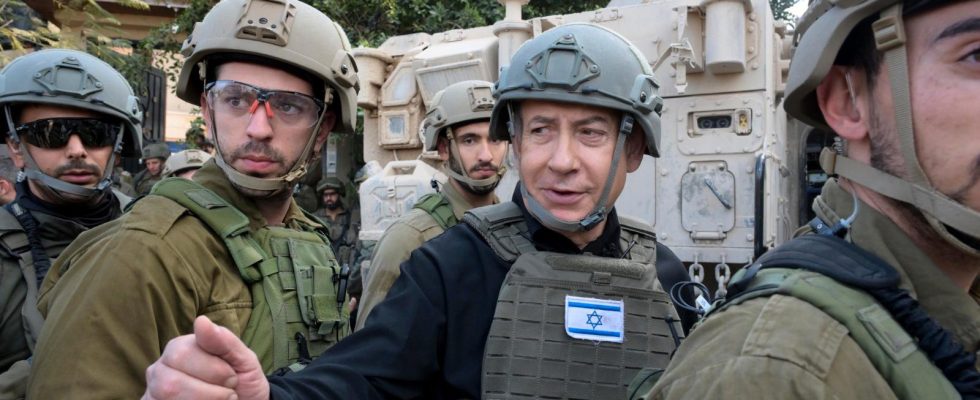unsaveSave
Israeli Prime Minister Benjamin Netanyahu visits soldiers in the northern Gaza Strip in December. Archive image.
1 / 3Photo: Avi Ohayon/AP/TT
A truce between Israel and Hamas seems to be getting closer.
The question is whether Benjamin Netanyahu even wants a cease-fire – and whether he manages to parry the conflicting forces in his motley government.
The outlines of a deal are clear: up to a six-week ceasefire and 30 to 40 Israeli hostages in exchange for around 300 imprisoned Palestinians, according to media reports. Mediators from Israel, Qatar, Egypt and the United States are said to have hammered out the foundations for a new ceasefire in Gaza over the weekend.
– When details start to emerge regarding the type of hostages and the number to be released, but also the length of the ceasefire itself, it indicates that a few steps have been taken along the way. That makes the whole thing a little more hopeful, says Isabell Schierenbeck, Middle East researcher and professor at the University of Gothenburg.
Go harder
According to Israeli media, the sketch is supported by the country’s war cabinet, which was appointed in October and has repeatedly gone against the government. The question is whether Prime Minister Netanyahu and the most extreme right-wing ministers in the government are on the same path. Among others, Finance Minister Bezalel Smotrich has dismissed the agreement and promised to vote against it, writes The Times of Israel.
– Netanyahu is trying to keep his coalition government together. There are forces in the government that really don’t want to prioritize the hostages and an agreement but go even harder in Gaza, but then there are those who are ambivalent and lean more towards the war cabinet, says Schierenbeck.
According to Israeli Keshet 12 sources, Netanyahu is “sabotaging” the peace talks by constantly adding more demands and limiting his delegation’s room for action.
New demands
This weekend, he is said to have suddenly demanded that Palestinians in the prisoner exchange convicted of serious crimes be deported to Qatar, as well as to receive a list of the hostages who are still alive.
– Netanyahu is not interested in an agreement. He is doing everything to derail the negotiations, says an anonymous official according to Keshet 12.
The outings can be seen as a way to put pressure, says Schierenbeck.
– We must remember that all statements that come now can also be directed inwards towards the ongoing negotiations, she says.
“Victory within reach”
Regardless of the ceasefire, Israel will carry out the heavily criticized offensive in Rafah in southern Gaza, according to Netanyahu. If an agreement is reached, the effort may be delayed – but it will happen, he told CBS News:
– Complete victory is within reach. We are not talking months, we are talking weeks as soon as we start the operation (in Rafah).
Ceasefire talks continue this week. Terror-labeled Hamas participates indirectly with representatives negotiating through proxies.
FACT Gaza and Hamas
The Gaza Strip is located at the southeastern corner of the Mediterranean Sea. In addition to the sea, Gaza borders Egypt in the southwest and is otherwise surrounded by Israel.
The population of the Gaza Strip has been estimated at just over two million people.
The area was part of the Ottoman Empire for several hundred years, later under British control (1918–48), and after that effectively under Egypt. Israel took possession of Gaza in the context of the 1967 Six-Day War.
According to the Oslo Accords from 1993, Israel must allow the Palestinian Authority (PA) some autonomy in the Gaza Strip.
The mid-00s became turbulent, with Israel first leaving its disputed settlements in Gaza and the hard-line Islamist Hamas soon after winning a parliamentary election there. Hamas wanted to form a broad coalition with al-Fatah and other Palestinian parties, but the talks failed. After a partly violent struggle, the Islamist movement unilaterally took power in Gaza in 2007. Thus, what remains of Palestinian self-government is split in two, as al-Fatah through the PA continues to rule the Israeli-occupied West Bank.
Since then, Israel has maintained a blockade against the area. Egypt has also treated Gaza restrictively.
Hamas, which is on the terrorist list by, among others, the EU and the US, and other militant Palestinian groups have fought several devastating wars against Israel in recent years. What is raging now is by far the biggest and bloodiest.
Source: Landguide/Foreign Policy Institute, National Encyclopedia
Read more
